RUSH: Here we go with the NPR and media stuff where they claim that they are not biased. And, by the way, who do you think it is that’s responsible for everybody thinking the media is biased? I’ll give you one guess. That’s right. That would be me, your beloved host. So here we go. Yesterday afternoon in Washington at the National Judicial College Symposium entitled, “Undermining the Courts and the Media: The Consequences for American Democracy.”
So you see this. While these people are undermining the 2016 presidential election, while these people are in the process of undermining the express will of the people and they’re attempting to undermine a duly elected presidency, they did a forum on what they think is the undermining of the courts and the media! They think somebody is sabotaging them! And they did this at the National Judicial College in a symposium. The moderator was Bob Garfield from NPR, and here’s part of his opening, I believe.
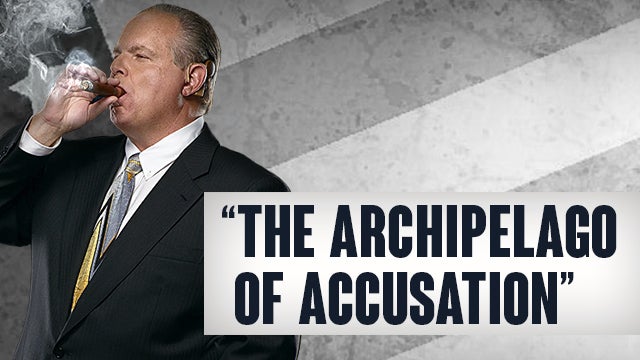 GARFIELD: Sixty-nine percent of U.S. adults said their trust in the news media has decreased in the past decade. Among conservatives, the number was 95%. But some of this, as we’re about to discuss, has to do with our demagogue president who dwells in alternate reality, dismisses actual reality as fake news, and declares media enemies of the people. Some of it has to do with the 50-year campaign to discredit so-called mainstream media by politicians and the archipelago of accusation, the likes of Limbaugh and Fox.
GARFIELD: Sixty-nine percent of U.S. adults said their trust in the news media has decreased in the past decade. Among conservatives, the number was 95%. But some of this, as we’re about to discuss, has to do with our demagogue president who dwells in alternate reality, dismisses actual reality as fake news, and declares media enemies of the people. Some of it has to do with the 50-year campaign to discredit so-called mainstream media by politicians and the archipelago of accusation, the likes of Limbaugh and Fox.
RUSH: The archipelago of accusation. That’s me, folks. New title, the Archipelago of Accusation, Limbaugh and Fox. A 50-year — no, 30, but who’s counting — campaign to discredit so-called mainstream media. Right here in this guy’s opening. “Well, some of this, as we’re about to discuss, has to do with our demagogue president.” And they claim they’re not biased. There’s no bias here. You people are all wet. Among conservatives, 95% have lost trust in the news media. And of course you wouldn’t have lost trust in the news media were it not for me, the demagogue of accusation.
These people still do not get it. Thirty years ago those of you listening today who were listening then, you were there 30 years ago. You thought 30 years what you think today. You weren’t sitting out, a mind-numbed nobody, and all of a sudden happened to cross me on the radio and then started thinking, “Oh, yeah, this guy’s right.” You already thought what you thought of the media. Many people already did.
My dad thought what he thought of the media and I never told him anything about it. He told me. But they think without me, the Archipelago of Accusation, that you wouldn’t distrust them as much as you do. So it’s my fault, because, you see, you are mind-numbed robots. You’re nothing but sponges. You don’t know anything. You’re just soaking up what a bunch of charlatans like me fill your skull full of mush with every day. It’s what they actively believe.
I’ll tell you, when you’ve got a problem and you don’t honestly identify it, cop to it, there’s no way you can fix it or assess it. So, once again they’re in circle-the-wagons, protect-themselves mode by making them out to be gigantic victims of the archipelago of accusation, me and Fox.
Back to the audio sound bites. So when we last left the symposium at the National Judicial College, “Undermining the Courts and the Media: The Consequences for American Democracy…” In fact, grab sound bite No. 3 again.
We’ll play these in order. Bob Garfield is moderating this important symposium. Again, it’s titled, “Undermining the courts and the media: The consequences for American democracy.” Oh, yeah. What happens when we undermine the media. It’s never asked what happens when the media undermines something. Have you noticed that? Nobody ever asks that, not an official symposium. No, it’s what happens to democracy when the media is undermined. And this is one of the statements made by the moderator of this symposium.
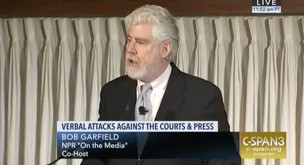 GARFIELD: Sixty-nine percent of U.S. adults said their trust in the news media has decreased in the past decade. Among conservatives, the number was 95%. But some of this, as we’re about to discuss, has to do with our demagogue president who dwells in alternate reality, dismisses actual reality as fake news, and declares media enemies of the people. Some of it has to do with the 50-year campaign to discredit so-called mainstream media by politicians and the archipelago of accusation, the likes of Limbaugh and Fox.
GARFIELD: Sixty-nine percent of U.S. adults said their trust in the news media has decreased in the past decade. Among conservatives, the number was 95%. But some of this, as we’re about to discuss, has to do with our demagogue president who dwells in alternate reality, dismisses actual reality as fake news, and declares media enemies of the people. Some of it has to do with the 50-year campaign to discredit so-called mainstream media by politicians and the archipelago of accusation, the likes of Limbaugh and Fox.
RUSH: The “archipelago of accusation.” So, I’m an island chain now. Call me “Archie” as a nickname. The likes of mainstream media, politicians, the archipelago of accusation. So they’re just clean and pure as the wind-driven snow, and then I came along and then Fox came along and poisoned your minds. Up next, Susan Page, who explains that there is no liberal bias in the media, none whatsoever, and here is what she offers as proof.
PAGE: I do not really think there’s a liberal bias in the press. I think there’s a conflict bias. We like conflict over things that work out well. There’s a bias for new over old. We like simple over complicated, black and white over gray, but I don’t think that’s fundamentally liberal. And if you think there’s a liberal bias, just ask the Obama White House if they saw a big liberal bias in the press that covered them, because they would have said no. There’s a conservative or establishment or some other kind of bias there.
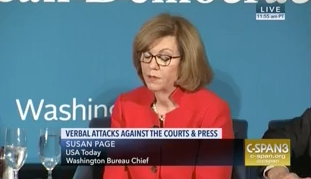 RUSH: The first part of this, “I think there’s a conflict bias. We like conflict over things that work out well.” Yeah, you do, but you make the conflict. You create the conflict. “We like conflict over things that work out well.” Boy, that’s big. The media doesn’t like things that work out well, folks. Well, right there we find ourselves add odds with them ’cause I’ll bet you nine out of 10 of you want things to work out well, whatever we’re talking about.
RUSH: The first part of this, “I think there’s a conflict bias. We like conflict over things that work out well.” Yeah, you do, but you make the conflict. You create the conflict. “We like conflict over things that work out well.” Boy, that’s big. The media doesn’t like things that work out well, folks. Well, right there we find ourselves add odds with them ’cause I’ll bet you nine out of 10 of you want things to work out well, whatever we’re talking about.
But she’s admitting that’s the worst thing in the world for the media. They need the conflict. They need demons. They need villains. And they claim there’s no liberal bias. When’s the last liberal villain you can recall in the Drive-By Media, folks? And there are so many conservative, Republican demons and villains that you can’t name them all. We’re all demons. We’re all villains. You can’t name a liberal Democrat villain. We don’t like things that work out well. We like conflict. And then there’s a bias for new over old. Is that why you liked Obama, ’cause he was new, fresh? Is that why you liked Obama, ’cause he was new?
I mean, Trump is new. There hasn’t ever been anybody like Trump. But, man, you don’t want that new. You want old. You want to go back to Obama, you want to go back to George H. W. Bush, Ms. Page? You people just got through lionizing a presidency from 1988 to 1992! You want to go back 30 years! You’re rejecting what’s new. The American people chose something brand-new, and you don’t like it at all.
She said, “We like black and white” — see, it depends on where you put the pause in there. “We like black and white over gray.” “We like black and white over gray.” Meaning they’re simpletons. They don’t like a bunch of gray area where you have to get in the weeds. They want something that’s simple to understand. They don’t want to take the complex and make it understandable. They want it to be simple from the get-go. Because they figure that’s the fastest route to persuading you.
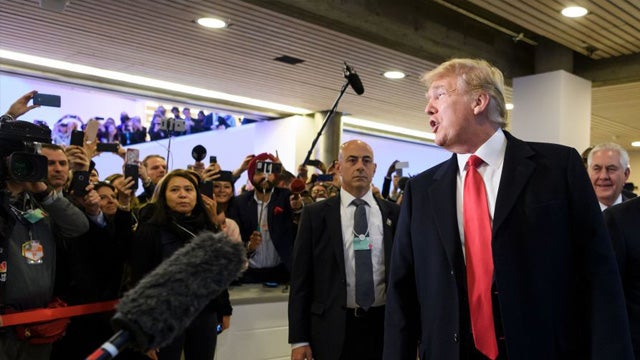 I don’t think any of that, she says, is fundamentally liberal. And if you think there’s a liberal bias, just ask Obama if they saw big liberal bias. Let me tell you something. You don’t think for a minute that Barack Obama and everybody in that administration knows and knew full well they had everybody in the media wrapped around their little finger? Obama didn’t respect the media precisely for that reason! They were too easy! They were a bunch of sycophants! They thought they were Obama equals! They don’t get that this class structure business with liberals is true. And Obama is in a class way up there and the media ain’t in it!
I don’t think any of that, she says, is fundamentally liberal. And if you think there’s a liberal bias, just ask Obama if they saw big liberal bias. Let me tell you something. You don’t think for a minute that Barack Obama and everybody in that administration knows and knew full well they had everybody in the media wrapped around their little finger? Obama didn’t respect the media precisely for that reason! They were too easy! They were a bunch of sycophants! They thought they were Obama equals! They don’t get that this class structure business with liberals is true. And Obama is in a class way up there and the media ain’t in it!
I don’t care how much David Brooks appreciated Obama’s crease in his slacks, he was never gonna be in Obama’s world. These journalists were never gonna be invited socially to the White House. Now, they may think that’s because of Obama’s bias against the media. It’s a class thing. The media is beneath people like Obama. The media is beneath people like Putin. The media is beneath people like Xi Jinping. And to the extent that Obama didn’t like the media, he didn’t like anybody exposing what he was doing. But they covered for most of it!
The real reason that Obama didn’t like the media was they’re so low class compared to him. They thought they were his equal. They thought that he knew they were his equal. They thought that he thought that they were all on the same team. They thought that he thought that they were wonderful. They thought that he respected and appreciated them. He didn’t. They are media. They are not on the same class, terms of height. And that’s the truth. These people, the Obamas, I mean, these are look down-your-nose types, smarter than everybody else, more sophisticated than everybody else. And to the extent that they appeared friendly with the media, that was just tolerance.
But don’t tell that to the media ’cause the media thinks Obama loved ’em and the media wanted Obama to love ’em. And the media wanted Bill Clinton to love ’em. Especially the female media. They loved Clinton. They were dreaming of Clinton. They looked at Monica Lewinsky, “Wat’s she got that I don’t?”
The female media just, I mean, dreamed of Bill Clinton. Nina Burleigh of TIME magazine wanted to give Clinton her own Lewinsky as thanks for protecting abortion. But Clinton, like Obama, the media, a necessary evil. But they always knew the media was on their side at the end of the day, because of politics.
BREAK TRANSCRIPT
RUSH: Let me grab a call ’cause I got two more of these bites in here and I’m not gonna get them both in before the break. So we go to Arlington, Texas, in the Dallas area. This is Deborah, and welcome. Great to have you here with us. Hi.
CALLER: Thank you, Rush. Merry Christmas from the great state of Texas. Yeah. My comment actually ties in very well right now. During the primary I was asked about, quote, the undocumented being in the shadows and wasn’t I concerned about them. And my response was they’re not in the shadows. They’re in our face. They want us to speak their language. They want to fly their flag. And NPR actually ran my quote over and over again trying to make me look like just a horrible person. They do try to direct how we feel, what we think. And I’ve noticed that since the caravan, you don’t hear that as much about in the shadows because they’re literally on our wall, in our border, in our face. And I’d like to hear your take on that.
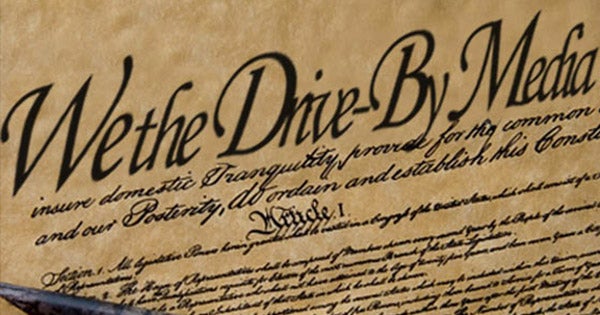 RUSH: Not only that, I mean, the caravan people, you probably heard this, the caravan people said, “Okay, Trump. We’ll turn around and go back if you give us $50,000 each.”
RUSH: Not only that, I mean, the caravan people, you probably heard this, the caravan people said, “Okay, Trump. We’ll turn around and go back if you give us $50,000 each.”
CALLER: Absolutely.
RUSH: “We want reparations. We’ll turn around and go away for 50 grand.” You know, you raise a good point. When were you polled? When did this happen? You said before what primary?
CALLER: The primary earlier this year. I’m in the congressional 6th — the congressional 6th district of Texas where —
RUSH: So it wasn’t November; it was before that?
CALLER: Yes, sir. It was back in… Well, I guess before March, probably —
RUSH: And what were they actually surveying? They asked you… What did they say about coming out of the —
CALLER: It wasn’t a survey. I was actually running for congressional office and I was asked by the media, and they just tried to make me look like I was a horrible person —
RUSH: Oh. Oh. Oh.
CALLER: Yeah.
RUSH: You’re a woman on the street, they ran into you with a camera and they wanted to know what you thought about —
CALLER: No. No, no. They interviewed me, and they just kept playing it over and over again. But I have noticed that they have stopped. But very few people that they talk to they say they like you commented earlier, they prefer the conflict. They don’t. They prefer to dictate the conflict. There’s a total —
RUSH: Oh. That’s true, but, I mean, they will create conflict. It is true they don’t like resolution. They don’t like things ending neatly. They do. And they will create the conflicted.
BREAK TRANSCRIPT
RUSH: Okay. Back to the panel of journalists at the National Judicial College Symposium entitled, “Undermining the Courts and the Media: The Consequences for American Democracy,” and here next is Cecilia Vega from ABC News who, again, says that the media is not biased politically. They are biased geographically. Here’s what she says…
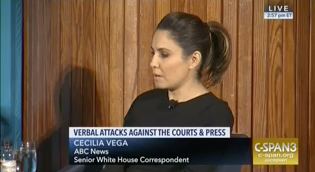 VEGA: There has been a geographic bias in newsrooms, and I think, uh, the surprise that so many of us all had on election night reflected that. We were not collectively doing a good job of covering this country and the people who live in it and their opinions in the lead-up to the election. And I don’t know that we still are today. Our editors, our producers, our management come from the same cities, the big cities in this country. And that has for a long time dictated how and where we focus our energy on our stories. I don’t think there’s a liberal bias, but there certainly is a bias when it comes to where we have focused our energy and coverage.
VEGA: There has been a geographic bias in newsrooms, and I think, uh, the surprise that so many of us all had on election night reflected that. We were not collectively doing a good job of covering this country and the people who live in it and their opinions in the lead-up to the election. And I don’t know that we still are today. Our editors, our producers, our management come from the same cities, the big cities in this country. And that has for a long time dictated how and where we focus our energy on our stories. I don’t think there’s a liberal bias, but there certainly is a bias when it comes to where we have focused our energy and coverage.
RUSH: Well, the two are inseparable here. If you’re admitting that your entire journalism staff is in big cities, by definition, they’re liberal — and if you’re then admitting that they don’t see how the rest of the country lives, it’s because they’re closed-minded or uninterested. I would suggest it’s more uninterested because of an arrogance and a condescension. I think they hold other people in contempt. I think journalists themselves do this, and then you get into big city dwellers.
They have… There’s always been sort of an arrogance about people who don’t live in the city. They’re not as worldly, sophisticated, experienced, aware, what have you. But, boy, are these people working hard to try to convince everybody at the “Undermining the Courts and the Media” symposium that there’s no liberal bias out there. See, and this is what really gets them in trouble. They sit there and lie to everybody and try to get away with it.
They’re still trying to operate under this premise that they are objective and fair — and that, “No, you’re misinterpreting liberal bias for the fact that we like conflict over things that work out well.” I’m telling you, that is a biggie. “We don’t like things that work out well.” Why not? I mean, aren’t you sick and tired of reading things — I know I am — that establishment types write, op-eds and columns about how (impression), “What we need are sober and serious and sophisticated people, uh, running our institutions of government.
“Uh, we need people who have been trained and educated and instructed on proper decorum and behavior.” Isn’t that why we’re in this mess? Where is it written that that class of people has any better idea how to save America, advance America, defend America than anybody else does? But that’s clearly what it is. (impression) “We need people with sober reflection, people who are very studious, people who are serious minded and understand the, ehhhh, obstacles against us and the various factions that we face and deal with it accordingly.”
You’re dealing with people that have no experience in the real world. But, boy, do they behave in ways we can be proud of! They don’t insult other people. Except the hell they don’t. They sure as hell do, day in and day out. (summarized) “We don’t like solutions and things that end well and we don’t like old. We prefer the new. But we’re not liberal. Don’t call us liberal! We may be a bunch of liberals and we may live in the cities and we may have disdain for the country, but don’t call us liberal.” Finally, Frank Sesno.

Frank Sesno used to be at CNN. I remember Frank Sesno. He was an anchor at CNN. I think he was a reporter at one time. I’ll tell you what I remember about Frank Sesno, and it’s not good or bad. It’s just something I remember. He was working at CNN. This is in the eighties, and might have been… Yeah, yeah. Yeah. It was the eighties, because Gorbachev was running the Soviet Union, and there was gonna be a G8 or a G10, some meeting of the world’s Western democracies, powerful economic countries getting together. We still have these things.
Gorbachev decided that he was gonna show up, he was gonna crash it, and Frank Sesno could not contain his excitement reporting it! Remember how Wolf Blitzer was having orgasms reporting Bush’s approval number finally down to the thirties? Frank Sesno could not, could not contain his enthusiasm for Gorbachev showing up at whatever it was, G8. I mean, it was breaking news. (shouting) “Mikhail Gorbachev! Mikhail Gorbachev is coming to the G8!” Breaking news, the lights and siren. “Mikhail Gorbachev!”
So what? Of course he’s coming! His economy is falling flat. He’s nothing but a Third World military state. But it was like the biggest star in the world. It was, “Mikhail Gorbachev!” I remember they didn’t like Reagan at all. That’s Frank Sesno. He did more than that. I’m just sharing with you that’s one of my memories. Sesno is now a media professor somewhere. It might well be at the George Washington University School of Media Public Affairs (I think he’s a director of that) and here’s what he said about the media not being liberal biased.
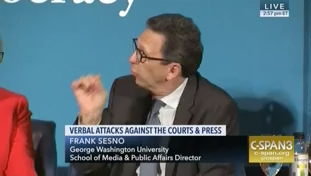 SESNO: The question that’s asked about are you liberal or conservative misses the point. If our job is to afflict the comfortable and comfort the afflicted — if our job is to give voice to the voiceless — that, I think, is sometimes what gets confused with a liberal bias. NPR did exceptional work during the campaign to get out into the country, to hear and to see and to listen. In the world of talk radio and talk television, however, most of the coverage was about horse race and people talking about people, rather than speaking with people. The preoccupation on talk radio and talk television with the horse race at the expense of policy and people has caused damage, I believe, to journalism and to the country. It’s something that requires a great and very close look.
SESNO: The question that’s asked about are you liberal or conservative misses the point. If our job is to afflict the comfortable and comfort the afflicted — if our job is to give voice to the voiceless — that, I think, is sometimes what gets confused with a liberal bias. NPR did exceptional work during the campaign to get out into the country, to hear and to see and to listen. In the world of talk radio and talk television, however, most of the coverage was about horse race and people talking about people, rather than speaking with people. The preoccupation on talk radio and talk television with the horse race at the expense of policy and people has caused damage, I believe, to journalism and to the country. It’s something that requires a great and very close look.
RUSH: All right. Now, this could not be more wrong. And I have you in this audience as living, walking proof that there is more discussion, informative, educational discussion — and opinion, by the way, nevertheless — of policy. You know more about the details of the news we cover on this show, be it the details of Obamacare that the media was not telling you, be it the details of Mueller’s investigation, the things that they’re not investigating.
The idea that here on talk radio audiences are not informed? It’s the exact opposite, Frank. With all due respect, sir, you are not listening. There is more education and more information provided on this program about the things I discuss. This isn’t talking at people. This is not people talking at, talking to people. This is people doing what you used to do: Inform. And, by the way, Frank, when I sit down here every day, I don’t think the way you do.
I don’t sit here and think I’ve gotta afflict the comfortable. Yeah, you gotta make the comfortable feel very uncomfortable today. And I’ve gotta make the uncomfortable feel comfortable. I don’t think this way. But that is a tenet of journalism. They are taught that. That’s journalism 101. You are to afflict the comfortable.
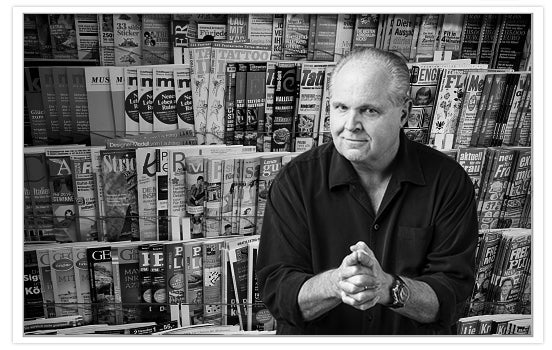
Translation: You are to go do hit pieces on the powerful. And you are not to do anything of the sort on the downtrodden. You are to be the champions of the downtrodden, and you are to take out the powerful as the oppressors. Our job is to give voice to the voiceless? Ah. The illegal immigrants would be voiceless, wouldn’t they? Except as our last caller said, they’re not voiceless. They’ve got more advocacy than conservatives have in this country.
There are more advocates for illegal immigrants and their cause than there is for conservatism or conservatives today. And I would maintain to you that the vast majority of the comfortable that these people are out afflicting is us! Wouldn’t you, Dawn? Yeah. Exactly right. But notice these tenets. “We’re not liberal. We’re not liberal. The biggest problem in America is talk radio and cable news, all they do is talk at. They don’t explore the issues. They just cause damage. We need to take a very close look at that. They’re talking about people rather than speaking with people.”
What does that even mean? I take calls on this program now and then. I speak with the people who call. And who is it he has to call out NPR because they’re one group that went to Iowa, one group that got a visa to get Illinois. These people, I tell you what. They are so full of themselves. Folks, can you imagine what this show would be if all I did every day is talk about what I do and how important it is and who out there is trying to undermine me? How long would you want to listen to that?
But these people get together and they do these symposiums where all they do is navel gaze and they come up with all these enemies that they then impugn by saying, “We’re not liberal. We don’t have any bias. We just want to afflict the comfortable.” By the way, why is that a tenet of journalism? Where did it even start? What purpose is served by finding somebody that is comfortable and making ’em nervous?
Is it the assumption that somebody comfortable has committed a crime or has been unethical or has cheated somebody in order to get comfortable? What’s the premise here? And don’t doubt me. It’s journalism 101. There’s many different versions of it. Afflict the comfortable and comfort the afflicted or whatever. To attack the powerful and defend the powerless and all that. But it’s all the same thing. And I wonder what the root of it is. Why is it good journalism to afflict the comfortable?
Why is being comfortable, powerful, successful, whatever, why does that make you a suspect? And of course if you’re a Kennedy and comfortable, you’re not a suspect. And if you’re an Obama and you’re comfortable, it doesn’t make you a suspect. If you’re Donald Trump and you’re comfortable, get out of the way. We’re not only gonna make Trump uncomfortable, we’re gonna make Trump wish he wasn’t alive. And we’re gonna call it good journalism.
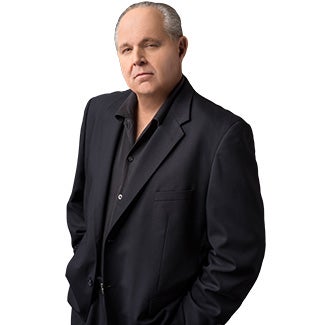 BREAK TRANSCRIPT
BREAK TRANSCRIPT
RUSH: It’s amazing, the Drive-Bys trying to make themselves look heroic. TIME magazine, they name themselves as people of the year. Did you see that? TIME magazine. Persons of the year, journalists. Because they’re facing such tremendous opposition and such heroism. And now this symposium.
Now, you want to hear an example of afflict the comfortable and comfort the afflicted? This is a story at BuzzFeed. “America has 14,000 golf courses and 6,000 refugees waiting at the border.” Meaning, “Are you kidding me? The rich and their private clubs have all that empty space just for playing golf, what rich people do when they’re out there making deals and denying everybody else, and these are private clubs and nobody can get in? Look at all the room we’ve got for these 6,000 refugees at the border if we would just take away from the golf course members their clubs.
See, afflict the comfortable, go ahead and take. These people have worked, they’ve joined, they’ve cultivated, people who run these places, families are members, but there’s a lot of wide open space on the golf course, 6,000 refugees. They’re poor, they’re thirsty, they’re hungry, we don’t have room, but the rich have all those golf courses, 14,000. Afflict the comfortable.


